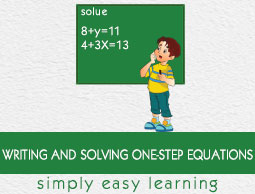
- Writing and Solving One-Step Equations
- Home
- Solving a One-Step Linear Equation Problem Type 1
- Solving a One-Step Linear Equation Problem Type 2
- Additive Property of Equality With Whole Numbers
- Solving an Equation With Multiplication or Division
- Multiplicative Property of Equality With Whole Numbers
- Translating a Sentence Into a One-Step Equation
Multiplicative Property of Equality With Whole Numbers Online Quiz
Following quiz provides Multiple Choice Questions (MCQs) related to Multiplicative Property of Equality With Whole Numbers. You will have to read all the given answers and click over the correct answer. If you are not sure about the answer then you can check the answer using Show Answer button. You can use Next Quiz button to check new set of questions in the quiz.

Q 1 - Solve the following linear equation with multiplication property of equality.
12d = 72
Answer : D
Explanation
Step 1:
12d = 72;
Using the multiplicative property of equality,
multiply both sides of equation by (1/12)
Step 2:
12d ($\frac{1}{12}$) = 72 ($\frac{1}{12}$)
So, d = 6
Q 2 - Solve the following linear equation with multiplication property of equality.
y 4 = 8
Answer : C
Explanation
Step 1:
y 4 = 8
Using the multiplicative property of equality,
multiply both sides of equation by (4)
Step 2:
$\frac{y}{4}$ 4 = 8 4 = 32
So, y = 32
Q 3 - Solve the following linear equation with multiplication property of equality.
11k = 165
Answer : A
Explanation
Step 1:
11k = 165
Using the multiplicative property of equality,
multiply both sides of equation by ($\frac{1}{11}$)
Step 2:
11k ($\frac{1}{11}$) = 165 ($\frac{1}{11}$)
So, k = 15
Q 4 - Solve the following linear equation with multiplication property of equality
14t = 98
Answer : B
Explanation
Step 1:
14t = 98
Using the multiplicative property of equality,
multiply both sides of equation by ($\frac{1}{14}$)
Step 2:
14t ($\frac{1}{14}$) = 98 ($\frac{1}{14}$)
So, t = 7
Q 5 - Solve the following linear equation with multiplication property of equality.
n 8 = 6
Answer : C
Explanation
Step 1:
n 8 = 6
Using the multiplicative property of equality,
multiply both sides of equation by 8
Step 2:
$\frac{n}{8}$ 8 = 6 8 = 48
So, n = 48
Q 6 - Solve the following linear equation with multiplication property of equality.
s 5 = 9
Answer : D
Explanation
Step 1:
s 5 = 9
Using the multiplicative property of equality,
multiply both sides of equation by 5
Step 2:
$\frac{s}{5}$ 5 = 9 5 = 45
So, s = 45
Q 7 - Solve the following linear equation with multiplication property of equality.
16t = 64
Answer : A
Explanation
Step 1:
16t = 64
Using the multiplicative property of equality,
multiply both sides of equation by ($\frac{1}{16}$)
Step 2:
16t ($\frac{1}{16}$) = 64 ($\frac{1}{16}$) = 4
So, t = 4
Q 8 - Solve the following linear equation with multiplication property of equality.
13r = 104
Answer : B
Explanation
Step 1:
13r = 104
Using the multiplicative property of equality,
multiply both sides of equation by ($\frac{1}{13}$)
Step 2:
13r ($\frac{1}{13}$) = 104 ($\frac{1}{13}$)
So, r = 8
Q 9 - Solve the following linear equation with multiplication property of equality.
7q = 56
Answer : C
Explanation
Step 1:
7q = 56
Using the multiplicative property of equality,
multiply both sides of equation by ($\frac{1}{7}$)
Step 2:
7q ($\frac{1}{7}$) = 56 ($\frac{1}{7}$)
So, q = 8
Q 10 - Solve the following linear equation with multiplication property of equality.
9m = 36
Answer : D
Explanation
Step 1:
9m = 36
Using the multiplicative property of equality,
multiply both sides of equation by ($\frac{1}{9}$)
Step 2:
9m ($\frac{1}{9}$) = 36 ($\frac{1}{9}$)
So, m = 4